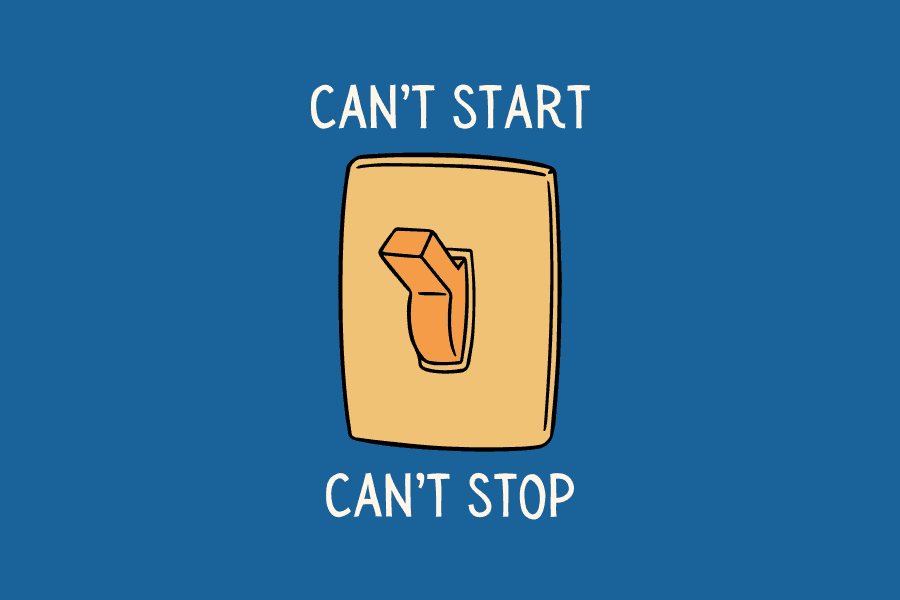ADHD in Adulthood
06 September 2024
While ADHD is often associated with hyperactive children, in adults it often looks vastly different. In the UK, a staggering 80% of adults with ADHD remain undiagnosed, facing significant challenges in their daily lives. In adults, ADHD can appear in various ways...

Inattention in Adults
Inattention in adults with ADHD can appear as procrastination, where tasks may be put off until the last minute or deadlines may even be missed, owing to difficulties with motivation and maintaining focus. Poor attention to detail may result in important information being overlooked or making careless mistakes.
Difficulty listening during conversations can lead to misunderstandings when individuals with ADHD may become easily distracted or lose track of the discussion. Forgetfulness is also common, with tasks and appointments often being missed. In addition, adults with ADHD may frequently misplace items or struggle with organizing their belongings and planning their day effectively.
Hyperactivity and Impulsivity in Adults
While hyperactivity may manifest differently in adults compared to children, it can still present challenges in daily life. Adults with ADHD might find themselves particularly talkative, finding it difficult to give others enough space to speak or tending to interrupt others or finish their sentences. They may experience constant feelings of restlessness, a need to always be busy, and difficulties relaxing and unwinding.
Even when physical restlessness is not an issue, adults with ADHD often find that their mind is always busy, and their thoughts are often racing. This can make it challenging to focus on any one thing at a time. Impatience is another common trait, with adults with ADHD often seeking immediate gratification and struggling to wait their turn or delay gratification.
Impact on Relationships
ADHD poses unique challenges in relationships, including difficulties with emotional regulation, communication, and managing responsibilities. Individuals with ADHD often struggle to manage their emotions, being quick to anger and frustration and being overly sensitive to perceived criticism or rejection. Mood swings and impulsivity can further strain relationships, as can difficulties with daily tasks and household responsibilities, which may burden partners.
In addition, the unpredictability and inconsistency that sometimes accompanies ADHD symptoms can make it difficult for friends and romantic partners to rely on and trust the individual with ADHD, leading to feelings of frustration and resentment, or partners feeling unheard. It is not uncommon for adults with ADHD to find that they fall into more of a parent – child dynamic in their relationship with their partner.
Impact on Work
In the workplace, ADHD can present challenges with organization, prioritization, and meeting deadlines, particularly with administrative tasks. Time management may also be problematic, as well as navigating relationships with colleagues and supervisors. However, ADHD can also bring benefits, such as creativity, problem-solving skills, and the ability to work well under pressure.
The hyperfocus that sometimes accompanies ADHD can lead to bursts of productivity and innovation, especially in environments that capture the individual's interest and passion. By harnessing these strengths and implementing strategies to mitigate challenges, individuals with ADHD can excel in their careers and make valuable contributions to their workplace.
Impact on Friendships
Adults with ADHD often find it challenging to maintain friendships, often struggling with staying in touch and remaining consistent. Difficulties with emotional regulation and impulsivity may lead to arguments or misunderstandings. Nonetheless, individuals with ADHD also bring strengths to friendships, such as loyalty, honesty, and a fun-loving nature.
Their spontaneity and creativity can infuse excitement and novelty into friendships, while their empathy and sensitivity foster deeper connections with others. By fostering open communication and understanding, friendships can thrive despite the challenges sometimes posed by ADHD.
Impact on Wellbeing
ADHD can significantly affect self-esteem, confidence, and mood, often leading to higher rates of depression and anxiety. The demands of adult life and societal expectations can exacerbate stress and frustration, contributing to feelings of hopelessness and anxiety.
Individuals with ADHD may feel overwhelmed by the constant need to navigate a world that often feels overwhelming and disorganized. Moreover, the stigma surrounding ADHD and mental health can further compound feelings of shame and isolation, making it difficult to seek help and support.
Why ADHD is Often Missed Until Adulthood
ADHD is frequently overlooked in childhood due to the support and scaffolding provided by parents and schools, as well as the development of coping mechanisms. However, as individuals enter adulthood and face increased demands and responsibilities, difficulties with attention and executive functioning may become more noticeable.
The structure and scaffolding provided by parents and schools may no longer be present, leading to challenges in managing daily life independently. Moreover, societal stigmas surrounding ADHD and mental health may discourage individuals from seeking assessment or support. As a result, many adults with ADHD go undiagnosed until later in life, despite experiencing significant challenges that could benefit from early intervention and support.
By raising awareness of the diverse ways ADHD manifests in adulthood and the challenges it presents, we can better support individuals with ADHD in navigating their daily lives and achieving their full potential.